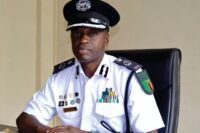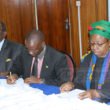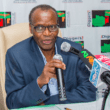The Civil Society Constitution Agenda (CiSCA) says discussing politics is not a crime to warrant people getting arrested for it.
And CiSCA has maintained its stance that the Church must lead the dialogue and reconciliation process.
At a press briefing held at the Zambia Civic Education Association yesterday, CiSCA president Bishop John Mambo observed that those in government had continued abusing the Public Order Act.
“It has been some time since President Edgar Lungu mentioned the need to review the Public Order Act, undoubtedly one of the most draconian pieces of legislation in our statute books, which is also one of the most abused. While we appreciate the recent announcement by the Ministry of Justice on the roll out of public provincial consultation on the review of the Public Order Act, we ask, what is the status of the of the review of the Public Order Act? In the meantime, while the President and government continue to give lip service about this important assignment, the Public Order Act continues to be used as a weapon to silence any dissenting voices including that of NGOs, as it happened in Ndola where NGO representatives and pastors were arrested on account that they wanted to discuss a political topic. When did discussing politics become outlawed in Zambia?” Bishop Mambo asked.
“Further this call for the review of the Public Order Act will be meaningless if the Constitution remains unattended to. So let government give us the refined draft constitution before heading to the review of the Public Order Act, as starting with the review of the Act may suggest revisiting the Act once the constitution is finally enacted.”
And CiSCA insisted that unlike ZCID, the church had a track record for brokering peace.
“On national dialogue and reconciliation, we reiterate our earlier suggestion and call that all stakeholders must allow the Church to handle this key national process. We are surprised that the Church’s leadership in this processes is being contested and yet, just a few weeks ago, the country was observing the day of national prayers, fasting and reconciliation led not by the ZCID but by the Church and attended by political party leaders. This puts the Church on an advantage to facilitate, lead and chair the entire processes like it did during the day of prayer, fasting and reconciliation. Therefore, we call on the ZCID and those supporting them to allow the Church to play its prophetic role and realise that the church is best positioned to handle such a process as its track record does show,” said Bishop Mambo.
“We respect all the eminent people who have been chosen by ZCID to lead the dialogue process, one of them is my lawyer, representing me in the Supreme Court case, Chifumu Banda, we respect all of them, there are also royal highnesses, all of them are qualified and we respect all of them. But we are simply saying they should be part of the dialogue and reconciliation process, led by the Church. If they asked me, I would have said, ‘since Archbishop Teresphore Mpundu started it, let’s give him chance to continue’. It’s like we are buying time, 2021 is around the corner, we Zambians know where we went wrong, we need to quickly deal with issues of the Public Order Act, the judicial reforms, the electoral reforms, and all outstanding issues that have caused the problems we are experiencing.”












